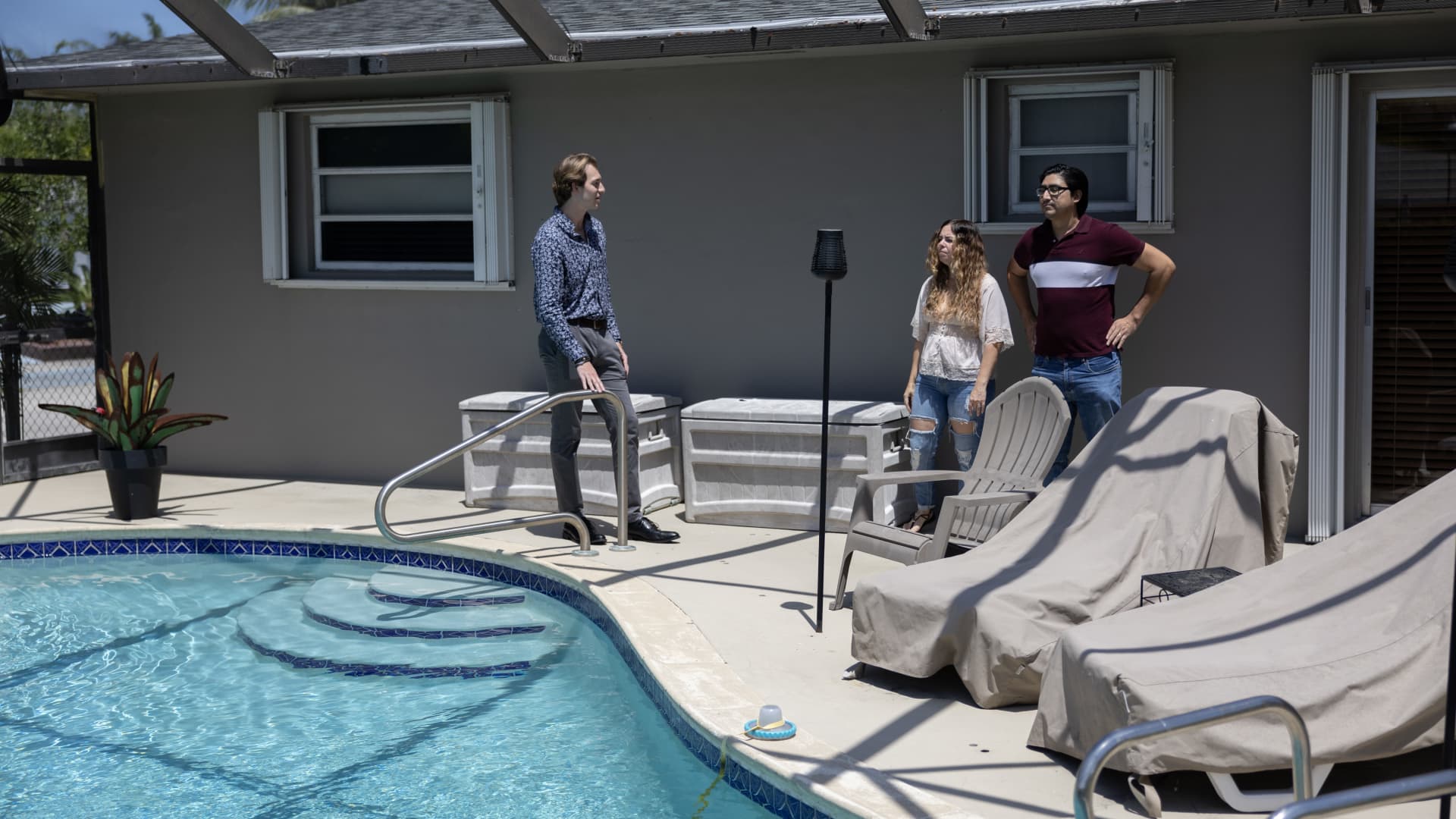Mortgage interest rates just hit a level not seen since the year 2000. As a result, mortgage demand is now sitting near a 27-year low.
Total mortgage application volume fell 1.3% last week compared with the previous week, according to the Mortgage Bankers Association’s seasonally adjusted index. Volume was 25.5% lower than the same week one year ago.
The average contract interest rate for 30-year fixed-rate mortgages with conforming loan balances ($726,200 or less) increased to 7.41%, from 7.31%, with points decreasing to 0.71 from 0.72 (including the origination fee) for loans with a 20% down payment. The rate was 6.52% one year ago.
The 30-year fixed jumbo mortgage rate increased to 7.34%, the highest rate in the history of the MBA’s jumbo rate series dating back to 2011.
And available inventory is low because people have 2.5% mortgages and would have to move to a much lesser valued house to have similar payments at 7%. But since the number of available houses is low, there are no cheaper houses.
Anyone feel like squatting in an AirBnB? I feel like getting rid of those could free up more stock.
Yep. Bought a home right before covid when interest rates were super low, I would love to sell my home and move but it would be the dumbest financial decision I’ve ever made.
Not to mention losing a couple bedrooms just to afford a new place.
Rent out your home and rent something else where you want to go. That way you keep building equity while renting and you provide a home for someone else. Sell when you are ready to buy in the new location or market conditions improve in your favor.
If you don’t want the landlord duties, outsource your home to a real estate management company.
deleted by creator
deleted by creator
This is a much larger factor in the drop off of mortgage requests, the “lock in” phenomenon is a real thing. It seems like there’s a lot of ignoring of this very simple fact. If you have a rate of 2.4% then why would you switch to a rate of approaching eight percent?
Let’s be real: the demand is as high as ever, but no one can afford the current prices + interest rates, and they know it, so they’ve given up trying.
I was explaining this to my father the other day. He’s considering moving and I did a little math for him on what the payment would be if he buys something at the same price point. Mortgage would go up over 50%.
It’s honestly astonishing the markets been flat with the increased rates. People shouldn’t, but they buy as much as they can possibly afford/can qualify for more often than not. With current rates the most people can afford is much more often becoming nothing.
I got lucky and bought a house when interest rates were still pretty low, though not rock bottom. I appreciate and am grateful for that, especially considering that I never in my life believed that I would be able to buy a house. However, I don’t like the house and would like to sell it and move in a few years, but it seems so unlikely to be realistic. The low interest rate is a benefit and a burden.
Yep. We want to move out of this shithole town. We know where we want to move. We would move tomorrow but at the current rates, we’d be destroyed financially if we did. And we own our home.
I have to move in around 6 months for work. Really not looking forward to making the impossible decision between spending 3000/mo for rent or seeing if I’m even eligible for a 450k mortgage @7%+ on a 40 year old property. I know renting would be cheaper now, but the mortgage won’t increase every single year.
I miss paying 1400/mo for a whole ass house in a nice area.
People with 2.5% locked in for 30 years really won the lottery.
Yeah but we can never refinance!
Ever!!!
Boo fuckin hoo
Why would you want to. You wouldn’t gain anything.
Cash out refi. Wish I had done it when we refied 2 years ago.
Not smart long term, especially in this economy.
We can never move. Ever.
Funny that’s what mine is listed for now. 4br 2 bath 1 car garage. $1400/month.
Hopefully it’s just the people who really need a home buying houses now, not all the investors grabbing them up.
The higher interest rates also discourages investors from buying houses too. Not because they don’t have the money to just pay cash for houses as investments, but because a high interest rate means there are MUCH SAFER investments that offer good returns than buying someone’s sketchy house in an uncertain housing market with disproportionately rising rent rates and are raising questions with lawmakers about rent stabilization.
Those investors can simply park their money in a bank and get decent nearly risk free returns on their money with zero work.
A lot of institutional money would much rather buy a mortgage security than actual property. However the costs of servicing basically killed any gains when rates were in the 3s. It’s going to take a few more years, but many companies will likely start to reduce their real estate holdings as they get 3 and 5 year ROI numbers that are equal or less than mortgage securities.








